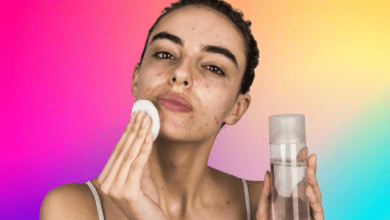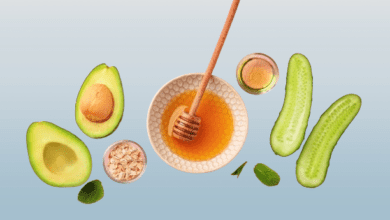The Ultimate Guide to Different Skin Types (Explained)

I’m sure you’ve asked yourself, “What is my skin type?” Can my skin type be changed, or? What distinguishes a skin type from a skin condition, for example?
A qualified skin therapist can provide you with a thorough evaluation of your skin, but you can better maintain the health of your skin by learning about the factors that contribute to different skin types.
What factors determine your skin type?
It’s very simple: reactivity or the amount of oil in the skin are used to determine skin type. Your skin type is inherited, as it is determined by genetics. Oily, dry, combination, balanced, sensitive, and acne are the six types of skin. To be clear, the term “skin complexion type” describes your skin’s genetic color, which can range from extremely fair to black.
Types and traits of skin
You can tell what type of skin you have if you know exactly what makes each type of skin. Then, a licensed skin therapist can confirm this. When analyzing your skin type, touch and feel your skin to feel its temperature and texture in addition to glancing at it in the mirror. Let’s examine each of the six skin types’ traits.
Features of greasy skin
The majority of us have some oil on our skin, but people with oily skin types typically have oily skin throughout their entire face because of overactive oil glands. The telltale signs of oily skin are larger pores and morning shine. Additionally, you might have congestion and breakouts anywhere on your face. If you have oily skin, you must include a double cleanse and exfoliation into your daily skincare regimen. For oily skin types, PreCleanse and Active Clay Cleanser are the ideal duo for double cleansing.
Features of chapped skin
Dry skin doesn’t produce enough oil, in stark contrast to oily skin. There won’t be any open pores or an oily sheen, and your skin will typically feel taut and taut. It’s interesting to note that most people don’t typically get dry skin when they’re young; instead, most people get it as they age. People often mistakenly believe they have dry skin when, in reality, they are dehydrated. This is a skin condition that occurs when the skin is deficient in moisture rather than oil. Investing in products that contain plant-based butters and oils, such as Melting Moisture Masque—a dry skin enthusiast’s dream come true—and milky cleansers and rich moisturizers is recommended for those with dry skin.
Qualities of combination skin
The most prevalent skin type is combination skin. You have skin that is in between oily and dry, with greasy skin in the T-Zone and dry skin on the outside of the face. Whether you have dry combination skin or oily combination skin, you’ll typically lean more one way than the other. For a combination skin type, foaming cleansers, hydrating serums, and medium weight moisturizers are ideal. For those with combination skin, Special Cleansing Gel and Skin Smoothing Cream are top picks.
Features of skin that is in balance
Occasionally called “normal” (is there such a thing?!) Not too little nor too much oil is secreted by a skin type that is balanced. There are no obvious open pores, congestion, or redness, and it is extremely balanced. This skin type can be maintained with foaming cleansers, hydrating formulas, and a straightforward, regular skincare regimen. Weekly use of Hydro Masque Exfoliant, a hydrating masque and mild exfoliant combined, will maintain well-balanced skin.
Traits of skin sensitivity
Since sensitivity can also be a skin condition, diagnosing this type of skin can be challenging. How long have you had reactive skin? This will help you determine if you have sensitive skin. Keep in mind that genetics largely determines skin type, so you’ve probably always been sensitive. Additionally, allergies that are common in sensitive skin types include eczema, hay fever, and asthma. Moreover, sensitive skin is linked to lighter skin tones originating from northern Europe. Sensitive skin types, like those with dry skin, should concentrate on rich formulas that fortify the barrier and aid in calming, cooling, and reducing redness. For skin types that are sensitive, the skincare maxim is “keep it simple.” As needed, spritz UltraCalming Mist on sensitive skin to soothe, cool, and hydrate it throughout the day.
Features of skin affected by acne
Given that breakouts or acne can be included in the list of skin conditions, acne skin types can be just as confusing as sensitive skin types. Once more, you are most likely an acne skin type and will always need to manage your breakouts if you have experienced inflammation and breakouts since a young age and if acne runs in your family. Exfoliation and double cleansing are crucial measures to encourage clearer skin, just like for oily skin. With its combination of hydrating actives and 2% salicylic acid, a plant-based complex that targets acne bacteria, AGE Bright Clearing Serum can be used every day to help prevent and treat breakouts. As an alternative, try Retinol Clearing Oil, a nourishing oil for nighttime use that contains 2% salicylic acid and retinol to minimize fine lines and breakouts while also addressing skin clarity and premature aging.
Can I change my skin type?
Although age, disease, and medication can alter your skin type, genetics is the primary factor that determines skin type. For instance, acne medication suppresses oil production; the duration and dosage of this action may cause your skin to become drier. Additionally, your skin type will gradually change as you get older. Most people’s skin gets drier as they age, and women’s skin frequently gets noticeably drier after menopause.
Every person has a different type of skin, so even if you have the same skin type as someone else, that doesn’t mean you have the same skin. Here’s where skin conditions come in: while we only have one skin type (at a time), skin conditions can affect all skin types.
What distinguishes a skin type from a skin condition?
You’re undoubtedly asking yourself, “What’s the deal with skin conditions?” now. Skin conditions can vary continuously and are influenced by various factors such as lifestyle, environment, and internal factors, while skin types are determined by genetics. An excellent illustration of this is the menstrual cycle. A week to ten days before their period, most women experience breakouts on their chins, which are linked to the ovaries in Chinese face mapping. This cycle repeats itself each month.
The good news about skin conditions is that they can usually be treated with proper skincare and environmental and internal changes, making them temporary.
Common ailments of the skin
The most prevalent skin disorders and the reasons behind them are:
- Dehydration is the result of the skin losing water. Along with flakiness, your skin may feel dry underneath and appear oily on top. Dehydration is frequently accompanied by congestion because the skin produces more oil to make up for the lost water.
- Sensitized: Skin damage and inflammation brought on by a variety of things, including synthetic fragrances, stripping alcohol (S.D. alcohol), improper product use, stress, pollution, and arid climates.
- Ageing: Although our bodies are naturally programmed to age, we now understand that factors other than heredity account for 50% of visible ageing.
- Pigmentation/uneven skin tone: Skin discoloration is primarily brought on by UV exposure, but it can also be brought on by hormonal fluctuations, trauma, and stress. Imagine the blemish that a breakout leaves on your skin.
- Congestion, also known as clogged pores, is a common sign of oily skin but can also result from other factors. This skin condition can be brought on by an uneven or subpar cleansing regimen, pollution, humidity, exercise, and diet.
- Hormonal fluctuations have been identified as a primary cause of breakouts. This includes stress hormones, which have the ability to raise inflammation and oil production. One of the main causes of acne is also a high-GI diet.
It’s easy to understand and difficult to understand your skin. When choosing your skincare regimen, take into account both your skin type and any skin conditions. We should be adaptable with our skincare regimen since our skin does change. Checking your skin at the change of seasons to see if your skincare regimen needs to be adjusted is a good habit to get into.
There is a sunscreen for every skin type.
Our skin is a remarkable organ that reveals much about our identity. For the sake of your skin’s health, a sunscreen is necessary regardless of your skin type and conditions. Regular use will not only help prevent skin cancer but also delay the signs of premature aging of the skin. Generally speaking, you should always wear sunscreen when it’s daylight outside!




